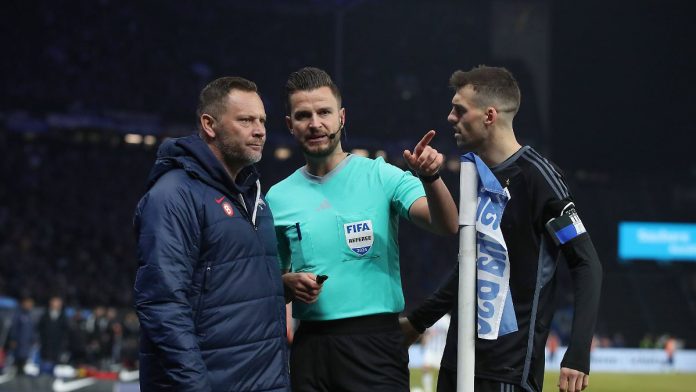Answers to tennis ball throws
Hertha protests could cost fans hundreds of thousands of euros
With a never-ending rain of tennis balls, Hertha BSC fans protested against the German Football League's investor plans during prime time. Even abandoning the game now seems possible in the deadlocked dispute. The DFL defends its ideas as an opportunity for development and greater competitiveness – and this is not going down well with some organized fans.
What happened in Berlin at the second division top match?
Tennis balls were flying onto the field from the Hamburg block in the first half. From the 53rd minute onwards, the Hertha curve started throwing them. The game was interrupted for more than 30 minutes and was about to be abandoned. Coach Pal Dardai and substitute goalkeeper Marius Gersbeck tried to influence the fans. Only after referee Daniel Schlager had sent the players off the field did the throwing subside.
“No referee and no club official wants a game to be abandoned because of this. Ultimately, we have to continue the game at some point,” said Schlager on Sport1. “If that is not possible, you have to resort to the last resort – that would have been abandoning the game. In theory, it was definitely possible today.” The Freiburg vs. Stuttgart game on Saturday was also interrupted for around ten minutes because fans threw objects onto the pitch. In Cologne, golden chocolate coins were thrown onto the pitch; this type of protest has been taking place regularly and persistently in many stadiums for weeks. This Sunday, the games in Elversberg (against Kaiserslautern) and in Hanover (against Rostock) were also temporarily interrupted.
Why do people keep protesting?
The active fan scene seems to have the feeling that the DFL wants to sit out the protests and that there is no reaction. “This vote with the approval that an investor can enter the league is completely wrong. And we have to try to defend ourselves against it somehow,” explained a representative of the Hertha fan scene in a conversation with the Berlin team on Saturday evening after the game. Even abandonment of the game would have been an option, it was said.
What is the DFL planning?
A financial investor is to pay one billion euros for a percentage share of the TV revenues. The DFL wants to invest a large part of the revenue in the further development of the business model, especially in strengthening foreign marketing and preventing illegal streaming. According to supervisory board chairman Hans-Joachim Watzke, the investor is to be presented this season. The DFL had reduced the number of applicants from the initial five to the two companies Blackstone and CVC in a unanimous executive committee decision.
What do the fans criticize?
There is a general scepticism among active fans towards investors in football, as they see this as a threat to traditions and a further commercialization of the sport. At Hertha, for example, the investment by Lars Windhorst has seen almost all the downsides of such models.
The process has been criticized for this. In the final vote of the 36 professional clubs for the billion-dollar deal in December, the necessary two-thirds majority was only just achieved. Questions were raised by Martin Kind of Hannover 96, who was instructed by the parent club to vote against it – but has not yet revealed his actual voting behavior. If he had voted “yes”, the approval would have been achieved only because of the smallest possible majority. The fan alliance “Unsere Kurve” is calling for the vote to be repeated.
What threat does the protests pose to Hertha – and what might the fans be threatened with?
The cash-strapped second division club fears financial consequences. “This will result in a severe penalty,” said managing director Thomas Herrich. He showed understanding for the protests – with reservations. “I completely understand the criticism. It is completely legitimate to take action and voice criticism. The way in which it is done is different. This went on for far too long for me,” said the 59-year-old.
The DFB announced that the control committee would investigate the events surrounding the interruption of play next week. The legal and procedural rules state that the fine generally depends largely on the number of objects thrown and the length of the interruption of play.
According to sports lawyer Paul Lambertz, the fans could have to pay the costs. “This is a claim for damages and you can enforce it against the fans,” he said. “Not against all fans, but only against those who caused the disturbance. You then have to see whether you can identify them.” This could be the case, for example, if the German Football Association imposes a fine on a club or a game without spectators.
“That can quickly add up to tens of thousands, maybe even hundreds of thousands of euros in damages,” said Lambertz. “These are not demands that can be avoided by filing for personal bankruptcy.”
Is rapprochement possible?
The fronts are hardened. Herrich announced a dialogue with the fans at Hertha, but the Berliners voted against the entry of an investor anyway. It will be more exciting to see whether the DFL or other clubs approach the fans again. Watzke recently said: “The discourse with critical fans makes us all stronger.” Without the active and diverse fan community, the stadium experience would be significantly poorer. “Mutual respect in the discussions is essential and, to be honest, can sometimes still be improved.”


